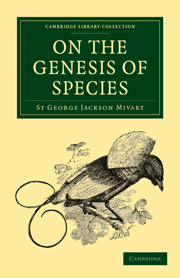Book contents
- Frontmatter
- Contents
- LIST OF ILLUSTRATIONS
- CHAPTER I INTRODUCTORY
- CHAPTER II THE INCOMPETENCY OF “NATURAL SELECTION” TO ACCOUNT FOR THE INCIPIENT STAGES OF USEFUL STRUCTURES
- CHAPTER III THE CO-EXISTENCE OF CLOSELY SIMILAR STRUCTURES OF DIVERSE ORIGIN
- CHAPTER IV MINUTE AND GRADUAL MODIFICATIONS
- CHAPTER V AS TO SPECIFIC STABILITY
- CHAPTER VI SPECIES AND TIME
- CHAPTER VII SPECIES AND SPACE
- CHAPTER VIII HOMOLOGIES
- CHAPTER IX EVOLUTION AND ETHICS
- CHAPTER X PANGENESIS
- CHAPTER XI SPECIFIC GENESIS
- CHAPTER XII THEOLOGY AND EVOLUTION
- INDEX
CHAPTER IX - EVOLUTION AND ETHICS
Published online by Cambridge University Press: 29 August 2010
- Frontmatter
- Contents
- LIST OF ILLUSTRATIONS
- CHAPTER I INTRODUCTORY
- CHAPTER II THE INCOMPETENCY OF “NATURAL SELECTION” TO ACCOUNT FOR THE INCIPIENT STAGES OF USEFUL STRUCTURES
- CHAPTER III THE CO-EXISTENCE OF CLOSELY SIMILAR STRUCTURES OF DIVERSE ORIGIN
- CHAPTER IV MINUTE AND GRADUAL MODIFICATIONS
- CHAPTER V AS TO SPECIFIC STABILITY
- CHAPTER VI SPECIES AND TIME
- CHAPTER VII SPECIES AND SPACE
- CHAPTER VIII HOMOLOGIES
- CHAPTER IX EVOLUTION AND ETHICS
- CHAPTER X PANGENESIS
- CHAPTER XI SPECIFIC GENESIS
- CHAPTER XII THEOLOGY AND EVOLUTION
- INDEX
Summary
Any inquiry into the origin of the notion of “morality”—the conception of “right”—may, perhaps, be considered as somewhat remote from the question of the Genesis of Species; the more so, since Mr. Darwin, at one time, disclaimed any pretension tc explain the origin of the higher psychical phenomena of man, His disciples, however, were never equally reticent, and indeed he himself is now not only about to produce a work on man (in which this question must be considered), but he has distinctly announced the extension of the application of his theory to the very phenomena in question. He says: “In the distant future I see open fields for far more important researches. Psychology will be based on a new foundation, that of the necessary acquirement of each mental power and capacity by gradation. Light will be thrown on the origin of man and his history.” It may not be amiss then to glance slightly at the question, so much disputed, concerning the origin of ethical conceptions and its bearing on the theory of “Natural Selection.”
The followers of Mr. John Stuart Mill, of Mr. Herbert Spencer, and apparently, also, of Mr. Darwin, assert that in spite of the great present difference between the ideas “useful” and “right,” yet that they are, nevertheless, one in origin, and that that origin consisted ultimately of pleasurable and painful sensations.
- Type
- Chapter
- Information
- On the Genesis of Species , pp. 188 - 207Publisher: Cambridge University PressPrint publication year: 2009First published in: 1871



